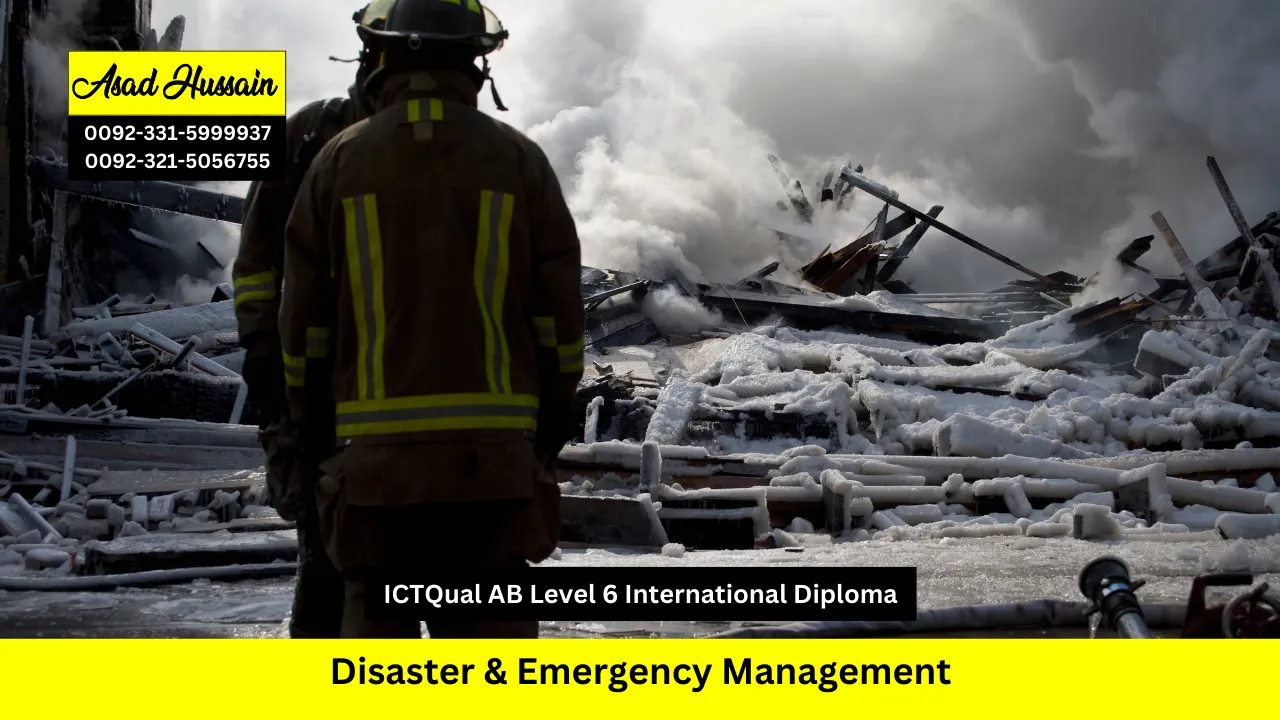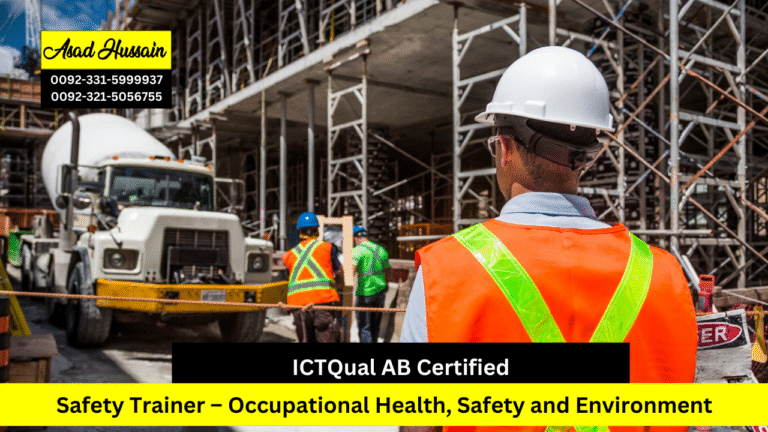In today’s rapidly changing world, the increasing frequency of natural disasters, technological hazards, and global crises highlights the urgent need for skilled professionals in disaster and emergency management. Communities, governments, and organizations across the globe require trained experts who can plan, respond, and recover effectively in the face of emergencies. The ICTQual AB Level 6 International Diploma in Disaster & Emergency Management provides a comprehensive platform for individuals aspiring to build careers in this critical and impactful field.
ICTQual ABLevel 6 International Diploma in Disaster & Emergency Management explores key areas such as disaster preparedness, risk assessment, crisis communication, emergency planning, recovery strategies, and resilience building. Learners will gain in-depth knowledge of international frameworks, policies, and best practices that guide effective disaster management. The program integrates theoretical foundations with real-world applications, enabling learners to address complex challenges with practical and strategic solutions.
Graduates of this diploma will be equipped with advanced skills in risk analysis, resource coordination, emergency operations, and humanitarian response. Through case studies, scenario-based learning, and project work, participants will develop the capacity to manage emergencies at local, national, and international levels.
By completing this globally recognized qualification, learners will be prepared to take on leadership roles in government agencies, NGOs, disaster relief organizations, healthcare systems, and corporate risk management departments. The diploma ensures that graduates are not only capable of mitigating risks and managing emergencies but also fostering resilience and sustainable recovery for communities worldwide.
Program Highlights
Study Units
Year 1 – Foundations of Disaster & Emergency Management
- Introduction to Disaster and Emergency Management
- Types and Causes of Disasters
- Principles of Risk Assessment and Management
- Emergency Planning and Preparedness
- Crisis Communication and Stakeholder Engagement
- Introduction to Humanitarian Response
- Disaster Legislation, Policies, and Governance
- Environmental Impacts of Disasters
- Resource Management in Emergency Situations
- Introduction to Project Management in Disaster Response
- Health and Safety in Disaster Management
- Ethical Considerations in Emergency Operations
Year 2 – Applied Disaster & Emergency Management Practices
- Advanced Risk Assessment and Vulnerability Analysis
- Disaster Mitigation Strategies
- Emergency Operations and Response Coordination
- Incident Command Systems and Leadership
- Humanitarian Logistics and Supply Chain Management
- Community Preparedness and Awareness Programmes
- Disaster Recovery and Rehabilitation Planning
- Crisis Management for Organisations and Institutions
- Use of Technology and Digital Tools in Disaster Management
- Environmental Sustainability in Disaster Operations
- Applied Research Methods in Disaster Management
- Operational Planning and Simulation Exercises
Year 3 – Strategic Leadership in Disaster & Emergency Management
- Strategic Leadership in Disaster Management
- International Disaster Management Frameworks and Standards
- Policy Development and Regulatory Compliance
- Advanced Crisis and Risk Communication
- Disaster Resilience and Business Continuity Planning
- Climate Change and Disaster Risk Reduction
- Emergency Preparedness for Critical Infrastructure
- Governance, Ethics, and Accountability in Disaster Management
- Innovation and Emerging Technologies in Emergency Response
- Strategic Planning and Resource Mobilisation
- Independent Research Project in Disaster & Emergency Management
- Capstone Project: Applied Disaster & Emergency Management
To maintain academic quality and ensure learners are well-prepared for advanced study, the ICTQual AB Level 6 International Diploma in Disaster & Emergency Management has clearly defined entry requirements. These criteria ensure that participants have the necessary knowledge, skills, and experience to succeed in the program while fostering a strong foundation for professional growth in disaster preparedness, risk reduction, and emergency response.
Age Requirements
- Applicants must be 18 years of age or older at the time of enrollment.
- Mature learners with significant professional or volunteer experience in emergency services, healthcare, or disaster response may also be considered.
Educational Requirements
- A Level 5 qualification or equivalent in public safety, management, health sciences, or a related discipline is required.
- Alternatively, learners who have completed a relevant course such as the ICTQual AB Level 5 Diploma in Health & Safety Management may directly progress to this diploma.
Professional Experience
- At least 2 years of professional experience in disaster response, emergency management, healthcare, or humanitarian services is preferred.
- Applicants with experience in policy development, risk management, or community resilience initiatives are strongly encouraged to apply.
English Language Proficiency
- Non-native English speakers must demonstrate language proficiency with an IELTS score of 5.5 or equivalent.
- Learners who have previously studied in English may be exempt from this requirement.
In conclusion, these entry requirements ensure that every learner admitted to the ICTQual AB Level 6 International Diploma in Disaster & Emergency Management is academically capable, professionally prepared, and linguistically proficient. By selecting candidates with strong educational foundations and relevant experience, the program builds a dynamic learning environment that equips participants with the skills and confidence to excel in disaster preparedness, emergency response, and crisis leadership.
The ICTQual AB Level 6 International Diploma in Disaster & Emergency Management equips learners with advanced knowledge, practical skills, and strategic competencies necessary for effective disaster preparedness, emergency response, and crisis management. The program integrates theoretical knowledge with practical applications, preparing graduates for professional and leadership roles in disaster and emergency management globally.
Year 1 – Foundations of Disaster & Emergency Management
Introduction to Disaster and Emergency Management
- Explain the principles, scope, and objectives of disaster and emergency management.
- Identify key roles and responsibilities in disaster preparedness and response.
- Apply foundational concepts to practical emergency scenarios.
Types and Causes of Disasters
- Classify natural, technological, and human-induced disasters.
- Analyze root causes and contributing factors of disasters.
- Apply knowledge to anticipate and mitigate potential disaster scenarios.
Principles of Risk Assessment and Management
- Conduct basic risk assessments for different disaster scenarios.
- Apply risk management techniques to minimize vulnerabilities.
- Evaluate risk mitigation measures using measurable indicators.
Emergency Planning and Preparedness
- Develop comprehensive emergency preparedness plans.
- Apply planning principles to ensure readiness for disasters.
- Assess the effectiveness of preparedness strategies through simulations.
Crisis Communication and Stakeholder Engagement
- Understand effective communication strategies during emergencies.
- Engage stakeholders and coordinate information flow in crises.
- Evaluate communication plans for clarity, accuracy, and impact.
Introduction to Humanitarian Response
- Explain the principles and processes of humanitarian aid delivery.
- Apply strategies for effective relief and support operations.
- Assess response effectiveness using measurable outcomes.
Disaster Legislation, Policies, and Governance
- Understand national and international legal frameworks for disaster management.
- Apply policy guidelines to operational decisions.
- Evaluate compliance with disaster governance standards.
Environmental Impacts of Disasters
- Analyze environmental consequences of natural and man-made disasters.
- Apply strategies for environmental mitigation and sustainability.
- Evaluate interventions for reducing environmental risks.
Resource Management in Emergency Situations
- Identify critical resources for disaster response and recovery.
- Apply resource allocation and management techniques.
- Monitor and evaluate resource utilization effectively.
Introduction to Project Management in Disaster Response
- Apply project management principles to disaster preparedness and recovery projects.
- Plan, implement, and monitor emergency projects.
- Assess project outcomes using measurable performance indicators.
Health and Safety in Disaster Management
- Identify health and safety risks in disaster and emergency contexts.
- Apply occupational and operational safety protocols.
- Evaluate safety measures for effectiveness and compliance.
Ethical Considerations in Emergency Operations
- Understand ethical principles relevant to disaster management.
- Apply ethical decision-making in emergency operations.
- Assess ethical compliance in operational and strategic actions.
Year 2 – Applied Disaster & Emergency Management Practices
Advanced Risk Assessment and Vulnerability Analysis
- Conduct comprehensive risk and vulnerability assessments.
- Apply advanced analytical tools to identify hazards and impacts.
- Evaluate assessment outcomes for decision-making in disaster management.
Disaster Mitigation Strategies
- Develop strategies to prevent or reduce disaster impacts.
- Apply mitigation techniques in real-world scenarios.
- Assess the effectiveness of mitigation measures using measurable standards.
Emergency Operations and Response Coordination
- Plan and coordinate emergency operations effectively.
- Apply incident management frameworks to optimize response.
- Evaluate operational performance against response objectives.
Incident Command Systems and Leadership
- Understand the principles and structure of incident command systems.
- Apply leadership skills in managing emergency teams and operations.
- Assess decision-making effectiveness during critical incidents.
Humanitarian Logistics and Supply Chain Management
- Manage logistics and supply chains for emergency response.
- Apply planning and coordination techniques to ensure timely delivery of aid.
- Evaluate efficiency and reliability of humanitarian logistics systems.
Community Preparedness and Awareness Programmes
- Develop community engagement strategies for disaster readiness.
- Apply educational and awareness initiatives to enhance resilience.
- Measure community preparedness levels using practical indicators.
Disaster Recovery and Rehabilitation Planning
- Plan post-disaster recovery and rehabilitation initiatives.
- Apply strategic planning to restore communities and infrastructure.
- Evaluate recovery plans using measurable outcomes.
Crisis Management for Organisations and Institutions
- Develop crisis management frameworks for organizations.
- Apply strategic decision-making in high-pressure scenarios.
- Assess crisis response effectiveness and organizational resilience.
Use of Technology and Digital Tools in Disaster Management
- Utilize digital tools, GIS, and data analytics in emergency management.
- Apply technology for monitoring, reporting, and decision support.
- Evaluate the effectiveness of digital solutions in disaster response.
Environmental Sustainability in Disaster Operations
- Apply sustainable practices in disaster relief and response operations.
- Assess environmental impact and implement mitigation strategies.
- Monitor long-term sustainability of emergency interventions.
Applied Research Methods in Disaster Management
- Conduct applied research to inform disaster management strategies.
- Use qualitative and quantitative methods to analyze data.
- Present research findings professionally using measurable standards.
Operational Planning and Simulation Exercises
- Participate in simulation exercises replicating disaster scenarios.
- Apply problem-solving and decision-making skills in practice.
- Evaluate performance using measurable operational metrics.
Year 3 – Strategic Leadership in Disaster & Emergency Management
Strategic Leadership in Disaster Management
- Develop strategic leadership skills for disaster operations.
- Apply leadership principles to guide teams and organizations.
- Evaluate leadership effectiveness using measurable indicators.
International Disaster Management Frameworks and Standards
- Understand global frameworks and best practices in disaster management.
- Apply international standards to organizational and operational processes.
- Assess compliance and effectiveness of implemented frameworks.
Policy Development and Regulatory Compliance
- Develop policies for disaster preparedness, response, and recovery.
- Apply regulatory requirements in operational and strategic decisions.
- Evaluate policy effectiveness using measurable outcomes.
Advanced Crisis and Risk Communication
- Implement advanced communication strategies during high-impact disasters.
- Engage stakeholders effectively for information dissemination.
- Evaluate communication performance and public response.
Disaster Resilience and Business Continuity Planning
- Develop strategies to enhance organizational and community resilience.
- Apply business continuity planning principles in disaster scenarios.
- Assess resilience outcomes using measurable standards.
Climate Change and Disaster Risk Reduction
- Understand the link between climate change and disaster risks.
- Apply strategies to mitigate climate-related disaster impacts.
- Evaluate effectiveness of risk reduction measures.
Emergency Preparedness for Critical Infrastructure
- Plan and implement emergency preparedness for critical infrastructure.
- Apply risk assessment and mitigation techniques to protect essential services.
- Monitor infrastructure readiness using measurable indicators.
Governance, Ethics, and Accountability in Disaster Management
- Apply governance frameworks and ethical principles in disaster operations.
- Ensure accountability in emergency management decision-making.
- Assess governance and ethical compliance using measurable standards.
Innovation and Emerging Technologies in Emergency Response
- Evaluate emerging technologies such as AI, IoT, and drones for disaster management.
- Apply innovative solutions to enhance emergency response efficiency.
- Assess the operational impact of technological adoption.
Strategic Planning and Resource Mobilisation
- Develop strategic plans for resource allocation and mobilization in disaster scenarios.
- Apply planning principles to optimize operational efficiency.
- Evaluate resource management outcomes using measurable standards.
Independent Research Project in Disaster & Emergency Management
- Conduct independent research on relevant disaster and emergency topics.
- Apply analytical and problem-solving skills to investigate real-world challenges.
- Present research findings in a professional and measurable format.
Capstone Project: Applied Disaster & Emergency Management
- Integrate knowledge and skills from all units into a comprehensive project.
- Apply strategic, operational, and leadership skills to solve complex disaster management scenarios.
- Evaluate project success using measurable performance and impact indicators.
Upon completion, learners will possess advanced knowledge, practical skills, and professional competencies to manage, respond to, and lead disaster and emergency operations, making them highly employable in national and international disaster management roles.
The ICTQual AB Level 6 International Diploma in Disaster & Emergency Management is designed for motivated learners who aspire to make an impact in crisis preparedness, disaster response, and emergency recovery. ICTQual ABLevel 6 International Diploma in Disaster & Emergency Management attracts individuals from diverse educational and professional backgrounds, all united by a commitment to safeguarding lives, resources, and communities in the face of disasters.
Educational Instructors and Trainers
- Instructors seeking to integrate disaster management and emergency planning into their teaching curriculum.
- Trainers aiming to expand their expertise to deliver practical, real-world knowledge in resilience and crisis management.
Environmental Advocates and Activists
- Advocates who wish to strengthen their ability to promote disaster risk reduction and sustainable recovery practices.
- Activists looking to gain internationally recognized credentials to enhance the impact of their community-focused initiatives.
Students and Recent Graduates
- Graduates from health sciences, social sciences, engineering, or public policy who aim to enter the field of disaster and emergency management.
- Students seeking to build specialized expertise that enhances employability in NGOs, government, or humanitarian organizations.
Career Changers
- Professionals from fields such as healthcare, security, logistics, or social services aiming to transition into emergency and disaster management.
- Individuals wishing to apply their transferable skills to support humanitarian response, risk reduction, and crisis leadership roles.
Policy Makers and Regulators
- Government officials responsible for shaping policies and governance frameworks around disaster risk management.
- Regulators seeking advanced knowledge to align national disaster strategies with international standards and best practices.
This diploma is ideally suited for learners who want to combine academic knowledge with practical application to protect communities, enhance resilience, and lead effective disaster responses. Whether you are an instructor, student, activist, policymaker, or career changer, the program equips you with the expertise and professional credibility to excel in disaster and emergency management at both national and international levels.







